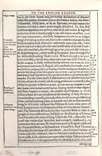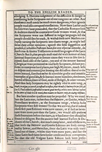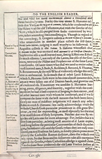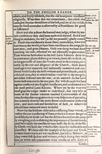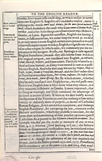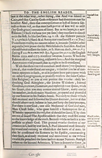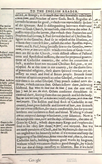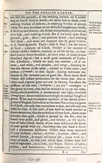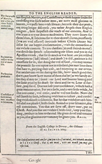TO THE RIGHT WELL-BELOVED ENGLISH READER
GRACE AND GLORY IN JESUS CHRIST EVERLASTING.
§1.At last through God’s goodness (most dearly beloved) we send you here the greater part of the Old Testament, as long since you received the New, faithfully translated into English. The residue is in hand to be finished: and your desire thereof shall not now (God prospering our intention) be long frustrated. As for the impediments, which hitherto have hindered this work, they all proceeded (as many do know) of one general cause, our poor estate in banishment. Wherein expecting better means, greater difficulties rather ensued. Nevertheless you will hereby the more perceive our fervent good will, ever to serve you, in that we have brought forth this Tome, in these hardest times, of above forty years, since this College was most happily begun. Wherefore we nothing doubt, but you our dearest, for whom we have dedicated our lives, will both pardon the long delay, which we could not prevent, and accept now this fruit of our labours, with like good affection, as we acknowledge them due, and offer the same unto you.
§2. If any demand, why it is now allowed to have the holy Scriptures in vulgar tongues, which generally is not permitted but in three sacred only, for further declaration of this, and other like points we remit you to the Preface before the New Testament. Only here, as by an Epitome, we shall repeat the sum of all that is there more largely discussed. To this first question therefore we answer, that both just reason and highest authority of the Church, judge it not absolutely necessary, nor always convenient, that holy Scriptures should be in vulgar tongues. For being as they are, hard to be understood, even by the learned, reason doth dictate to reasonable men, that they were not written nor ordained to be read indifferently of all men. Experience also teacheth, that through ignorance, joined often with pride and presumption, many reading Scriptures have erred grossly by misunderstanding God’s word. Which though it be most pure in itself, yet the sense being adulterated is as perilous (saith Tertullian) as the style corrupted. St. Ambrose observeth, that where the text is true, the Arian’s interpretation hath errors. St. Augustine also teacheth, that heresies and perverse doctrines entangling souls, and throwing them down headlong into the depth, do not otherwise spring up but when good (or true) Scriptures are not well (and truly) understood, and when that which in them is not well understood, is also rashly and boldly avouched. For the same cause, St. Jerome utterly disallowed, that all sorts of men and women, old and young, presumed to read and talk of the Scriptures: whereas no artisan, no tradesman dare presume to teach any faculty, which he hath not first learned. Seeing therefore that dangers and hurts happen in many, the careful chief Pastors in God’s Church have always moderated the reading of holy Scriptures, according to persons, times, and other circumstances; prohibiting some, and permitting some, to have and read them in their mother tongue. So St. Chrysostom translated the Psalms and some other parts of holy Scriptures for the Armenians, when he was there in banishment. The Slavonians and Goths say they have the Bible in their languages. It was translated into Italian by an Archbishop of Genva. Into French in the time of King Charles the Fifth, especially because the Waldensian heretics had corruptly translated it, to maintain their errors. We had some parts in English translated by Venerable Bede, as Malmsbury witnesseth. And Thomas Arundel, Archbishop of Canterbury, in a Council held at Oxford, strictly ordained, that no heretical translation set forth by Wycliffe and his accomplices, nor any other vulgar Edition should be suffered, until it were approved by the Ordinary of the Diocese alleging St. Jerom’s judgement of the difficulty and danger in translating holy Scriptures out of one tongue into another. And therefore it must needs be much more dangerous, when ignorant people read also corrupted translations. Now since Luther and his followers have pretended, that the Catholic Roman faith and doctrine should be contrary to God’s written word, and that the Scriptures were not suffered in vulgar languages lest the people should see the truth, and withal these new Masters corruptly turning the Scriptures into diverse tongues, as might best serve their own opinions; against this false suggestion, and practise, Catholic Pastors have, for one especial remedy, set forth true and sincere Translations in most languages of the Latin Church. But so, that people must read them with licence of their spiritual Superior, as in former times they were in like sort limited. Such also of the Laity, yea and of the meaner learned Clergy, as were permitted to read holy Scriptures, did not presume to interpret hard places, nor high Mysteries, much less to dispute and contend, but leaving the discussion thereof to the more learned, searched rather and noted the godly and imitable examples of good life, and so learned more humility, obedience, hatred of sin, fear of God, zeal of Religion, and other virtues. And thus holy Scriptures may be rightly used in any tongue, to teach, to argue, to correct, to instruct in justice, that the man of God may be perfect, and (as St. Paul addeth) instructed to every good work, when men labour rather to be doers of God’s will and word, than readers or hearers only, deceiving themselves.
§3. But here another question may be proposed: Why we translate the Latin text, rather than the Hebrew, or Greek, which Protestants prefer, as the fountain tongues, wherein holy Scriptures were first written? To this we answer, that if indeed those first pure Editions were now extant, or if such as be extant were more pure than the Latin, we would also prefer such fountains before the rivers, in whatsoever they should be found to disagree. But the ancient best learned Fathers and Doctors of the Church, do much complain, and testify to us, that both the Hebrew and Greek Editions are foully corrupted by Jews, and Heretics, since the Latin was truly translated out of them, while they were more pure; and that the same Latin hath been far better conserved from corruptions. So that the old Vulgate Latin Edition hath been preferred and used for most authentic above a thousand and three hundred years. For by this very term St. Jerome calleth that Version the vulgate or common, which he conferred with the Hebrew of the old Testament, and with the Greek of the New; which he also purged from faults committed by writers, rather amending than translating it. Though in regard of this amending, St. Gregory calleth it the new version of St. Jerome: who nevertheless in another place calleth the self-same, the old Latin Edition, judging it most worthy to be followed. St. Augustine calleth it the Italian. St. Isidorus witnesseth that St. Jerom’s version was received and approved by all the Christian Churches. Sophronius also a most learned man, seeing St. Jerom’s Edition so much esteemed, not only of the Latins, but also of the Grecians, turned the Psalter and Prophets out of the same Latin into Greek. Of latter times what shall we need to recite other most learned men, St. Bede, St. Anselm, St. Bernard, St. Thomas, St. Bonaventure, and the rest? Who all uniformly allege this only text as authentic. In so much that all other Latin Editions, which St. Jerome saith were in his time almost innumerable, are as it were fallen out of all Divine’s hands, and grown out of credit and use. If moreover we consider St. Jerome’s learning, piety, diligence, and sincerity, together with the commodities he had of best copies in all languages then extant, and of other learned men with whom he conferred; and if we so compare the same with the best means that hath been since, surely no man of indifferent judgement, will match any other Edition with St. Jerom’s: but easily acknowledge with the whole Church God’s particular providence in this great Doctor, as well for expounding, as most especially for the true text and Edition of Holy Scriptures. Neither do we fly unto this old Latin text for more advantage: For, besides that it is free from partiality, as being most ancient of all Latin copies, and long before the particular Controversies of these days began, the Hebrew also and the Greek when they are truly translated, yea and Erasmus his Latin, in sundry places prove more plainly the Catholic Roman doctrine, than this which we rely upon. So that Beza and his followers take also exception against the Greek, when Catholics allege it against them. Yea the same Beza preferreth the old Latin Version before all others, and freely testifieth, that the old Interpreter translated religiously. What then do our countrymen, that refuse this Latin, but deprive themselves of the best, and yet all this while have set forth none, that is allowed by all Protestants for good or sufficient?
§4. How well this is done the learned may judge, when by mature conference they shall have made trial thereof. And if anything be mistaken, we will (as still we promise) gladly correct it. Those that translated it about thirty years since, were well known to the world, to have been excellent in the tongues, sincere men, and great Divines. Only one thing we have done touching the text, whereof we are especially to give notice: That whereas heretofore in the best Latin Editions there remained many places differing in words, some also in sense, as in long process of time the writers erred in their copies, now lately by the care and diligence of the Church, those diverse readings were maturely and judiciously examined and conferred with sundry the best written and printed books, and so resolved upon, that all which before were left in the margin, are either restored into the text, or else omitted; so that now none such remain in the margin. For which cause we have again conferred this English translation, and conformed it to the most perfect Latin Edition. Where yet by the way we must give the vulgar reader to understand, that very few or none of the former varieties touched Controversies of this time. So that this recognition is no way suspicious of partiality, but is merely done for the more secure conservation of the true text, and more ease and satisfaction of such, as otherwise should have remained more doubtful.
§5. Now for the strictness observed in translating some words, or rather the not translating of some, which is in more danger to be disliked, we doubt not but the discreet learned reader, deeply weighing and considering the importance of sacred words, and how easily the translator may miss the sense of the Holy Ghost, will hold that which is here done for reasonable and necessary. We have also the example of the Latin and Greek, where some words are not translated, but left in Hebrew, as they were first spoken and written; which seeing they could not, or were not convenient to be translated into Latin or Greek, how much less could they, or was it reason to turn them into English? St. Augustine also yieldeth a reason, exemplifying in the words Amen and Alleluia, for the more sacred authority thereof. Which doubtless is the cause why some name of solemn Feasts, Sacrifices, and other holy things are reserved in sacred tongues, Hebrew, Greek, or Latin. Again for necessity, English not having a name, or sufficient term, we either keep the word as we find it, or only turn it to our English termination, because it would otherwise require many words in English, to signify one word of another tongue. In which cases, we commonly put the explication in the margin. Briefly, our Apology is easy against English Protestants; because they also reserve some words in the original tongues, not translated into English, as Sabboath, Ephod, Pentecost, Proselyte, and some others. The sense whereof is indeed as soon learned, as if they were turned so near as is possible into English. And why then may we not say Prepuce, Phase or Pasch, Azymes, Breads of Proposition, Holocaust, and the like? Rather than as Protestants translate them, Foreskin, Passover, The feast of sweet breads, Show breads, Burnt offerings etc. By which terms, whether they be truly translated into English or not, we will pass over. Sure it is an Englishman is still to seek what they mean, as if they remained in Hebrew or Greek. It more importeth, that nothing be wittingly and falsely translated for advantage of doctrine in matter of faith. Wherein as we dare boldly avouch the sincerity of this Translation, and that nothing is here either untruly or obscurely done of purpose, in favour of Catholic Roman Religion, so we cannot but complain, and challenge English Protestants, for corrupting the text, contrary to the Hebrew and Greek, which they profess to translate, for the more show and maintaining of their peculiar opinions against Catholics: as is proved in the Discovery of manifold corruptions. For example we shall put the reader in memory of one or two. Gen. 4:7, whereas (God speaking to Cain) the Hebrew words in Grammatical construction may be translated either thus Unto thee also pertaineth the lust thereof, and thou shalt have dominion over it: or thus; Also unto thee his desire shall be subject, and thou shalt rule over him: though the coherence of the text requireth the former, and in the Bibles printed 1552 and 1577 Protestants did so translate it: yet in the years 1579 and 1603 they translate it the other way, rather saying, that Abel was subject to Cain, and that Cain by God’s ordinance had dominion over his brother Abel, than that concupiscence or lust of sin is subject to man’s will, or that man hath power of free-will to resist (by God’s grace) temptation of sin. But as we hear, in a new Edition (which we have not yet seen) they translate it almost as in the first. In like sort Gen. 14:18 the Hebrew particle Vav, which St. Jerom and all Antiquity translated Enim (For) Protestants will by no means admit it, because (besides other arguments) we prove thereby Melchisedech’s Sacrifice. And yet themselves translate the same, as St. Jerom doth, Gen. 20, 3, saying: For she is a man’s wife. etc. Again Gen. 31, 19, the English Bibles 1552 and 1577 translate Theraphim, Images. Which the Edition of 1603 correcting, translateth Idols. And the marginal Annotation well prove, that it ought to be so translated.
§6. With this then we will conclude most dear (we speak to you all, that understand our tongue, whether you be of contrary opinions in faith, or of mundane fear participate with another Congregation, or profess with us the same Catholic Religion) to you all we present this work: daily beseeching God Almighty, the Divine Wisdom, Eternal Goodness, to create, illuminate, and replenish your spirits, with his Grace, that you may attain eternal Glory, every one in his measure, in those many Mansions, prepared and promised by our Saviour in his Father’s house. Not only to those which first received and followed his Divine doctrine, but to all that should afterwards believe in him, and keep the same precepts. For there is one God, one also Mediator of God and men, Man Christ Jesus, who gave himself a Redemption for all. Whereby appeareth his will, that all should be saved. Why then are not all saved? The Apostle addeth: that they must first come to the knowledge of the truth. Because without faith it is impossible to please God. This ground-work therefore of our creation in Christ by true faith, St. Paul laboured most seriously by word and writing to establish in the hearts of all men. In this he confirmed the Romans by his Epistle, commending their faith, as already received and renowned in the whole world. He preached the same faith to many Nations. Amongst others to the learned Athenians. Where it seemed to some, as absurd, as strange; in so much that they scornfully called him a word-sower, and Preacher of new Gods. But St. Augustine alloweth the term for good, which was reproachfully spoken of the ignorant. And so distinguishing between Reapers and Sowers in God’s Church, he teacheth, that whereas the other Apostles reaped in the Jews, that which their Patriarches and Prophets had sown; St. Paul sowed the seed of Christian Religion in the Gentiles. And so in respect of the Israelites, to whom they were first sent, calleth the other Apostles Messores, Reapers, and St. Paul, being specially sent to the Gentiles, Seminatorem, a Sower, or Seminary Apostle: which two sorts of God’s workmen are still in the Church, with distinct offices of Pastoral cures and Apostolic missions; the one for perpetual government of Catholic countries, the other for conversion of such, as either have not received Christian Religion, or are relapsed. As at this time in our country, for the diverse sorts of pretended religions, these diverse spiritual works are necessary to teach and feed all British people. Because some in error of opinions preach another Ghospel, whereas in verity there is no other Ghospel. They preach indeed new doctrines, which cannot save. Others follow them, believing falsehood. But when the blind lead the blind (not the one only but) both fall into the ditch. Others conform themselves in external show, fearing them that can punish and kill the body. But our Lord will bring such as decline into (unjust) obligations, with them that work iniquity. The Relics and small flock of Catholics in our country, have great sadness and sorrow of heart, not so much for our own affliction, for that is comfortable, but for you our brethren and kinsmen in flesh and blood. Wishing with our own temporal damage whatsoever, your salvation. Now is the acceptable time, now are the days of salvation, the time of Grace by Christ, whose days many Kings and Prophets desired to see: they saw them (in spirit) and rejoiced. But we are made partakers of Christ, and his Mysteries; so that our selves neglect not his heavenly riches: if we receive and keep the beginning of his substance, firm unto the end; that is, the true Catholic faith; building thereon good works by his grace; without which we cannot think a good thought, by which we can do all things necessary to salvation. But if we hold not fast this ground, all the building fails. Or if confessing to know God in words, we deny him in deeds, committing works of darkness, or omitting works of mercy, when we may do them to our distressed neighbours; briefly, if we have not charity, the form and perfection of all virtues, all is lost, and nothing worth. But if we build upon firm ground, gold, silver, and precious stones, such building shall abide, and make our vocation sure by good works, as St. Peter speaketh. These (saith St. Paul) are the heirs of God, co-heirs of Christ. Neither is the number of Christ’s blessed children counted, as of the Jews, a hundred forty four thousand, of every tribe of Israel twelve thousand signed; but a most great multitude of Catholic Christians, which no man can number, of all nations, and tribes, and peoples, and tongues, standing before the throne of the lamb, clothed in white robes, and palms (of triumph) in their hands: having overcome temptations in the virtuous race of good life. Much more those which also endure persecution for the truth’s sake shall receive most copious great rewards in heaven. For even though the passions of this time (in themselves) are not [a] condigne to the glory to come, that shall be revealed in us: yet our tribulation, which presently is momentary and light, worketh (through grace) above measure exceedingly an eternal weight of glory. What shall we therefore meditate of the special prerogative of English Catholics at this time? For to you it is given for Christ, not only that you believe in him, but also that you suffer for him. A little now, if you must be made pensive in diverse temptations, that the probation of your faith, much more precious than gold, which is proved by the fire, may be found unto praise, and glory, and honour, in the revelation of Jesus Christ. Many of you have sustained the spoil of your goods with joy, knowing that you have a better and a permanent substance. Others have been deprived of your children, fathers, mothers, brothers, sisters, and nearest friends, in ready resolution also, some with sentence of death, to lose your own lives. Others have had trial of reproaches, mockeries, and stripes. Others of bands, prisons, and banishments. The innumerable renowned late English Martyrs, and Confessors, whose happy souls for confessing true faith before men, are now most glorious in heaven, we pass here with silence; because their due praise, requiring longer discourse, yea rather Angels than English tongues, far surpasseth the reach of our conceits. And so we leave it to your devout meditation. They now secure for themselves, and solicitous for us their dearest clients, incessantly (we are well assured) intercede before Christ’s Divine Majesty for our happy consummation, with the conversion of our whole country. To you therefore (dearest friends mortal) we direct this speech: admonishing ourselves and you in the Apostle’s words, that for so much as we have not yet resisted temptations to (last) blood (and death) itself, patience is still necessary for us, that doing the will of God, we may receive the promise: So we repine not in the tribulation, but ever love them that hate us, pitying their case, and rejoicing in our own. For neither can we see during this life, how much good they do us; nor know how many of them shall be (as we heartily desire they all may be) saved: our Lord and Saviour having paid the same price by his death for them and for us. Love all therefore, pray for all. Do not lose your confidence, which hath a great remuneration. For yet a little, and a very little while, he that is to come, will come, and he will not slack. Now the just lives by faith, believing with heart to justice, and confessing with mouth to salvation. But he that withdraweth himself shall not please Christ’s soul. Attend to your salvation, dearest countrymen. And you that are far off, draw near, put on Christ. And you that are within Christ’s fold, keep your standing, persevere in him to the end. His grace dwell and remain in you, that glorious crowns may be given to you. Amen.
From the English College in Doway,
the Octaves of All Saints, 1609.
The God of patience and comfort give you to be of one mind, one towards another in Jesus Christ; that of one mind, with one mouth you may glorify God.
Footnotes
- ↑ Worthy, or comparable in dignity. 2. Cor. 4.
Margin Notes
- §1. The cause of delay in setting forth this English Bible.
- §2. Why and how it is allowed to have holy Scriptures in vulgar tongues.
- §2. Scriptures being hard are not to be read of all.
- §2. Many take harm by reading holy Scriptures.
- §2. Reading of Scriptures moderated.
- §2. Scriptures translated into diverse tongues.
- §2. A calumnious suggestion of Lutherans.
- §2. What part of Scriptures be most convenient for vulgar readers.
- §3. Why we translate the old Latin text.
- §3. More pure than the Hebrew or Greek now extant.
- §3. Received by all Churches.
- §3. Turned into Greek.
- §3. All others grown out of use.
- §3. St. Jerom excelled all other Doctors in translating and expounding holy Scriptures.
- §3. His Edition free from partiality.
- §3. Preferred before all other Editions by Beza.
- §3. None yet in England allowed for sufficient.
- §4. What is done in this edition.
- §4. Diverse readings resolved upon, and none left in the margin.
- §4. They touched not present controversies.
- §5. Why some words are not translated into vulgar English.
- §5. Some Hebrew words not translated into Latin nor Greek.
- §5. More authority in sacred tongues.
- §5. Some words cannot be turned into English.
- §5. Protestants leave some words untranslated.
- §5. Corruptions in Protestant’s Translations of holy Scriptures, of purpose against Catholic doctrine.
- §5. Against Melchisedech’s sacrifice.
- §5. And against holy Images.
- §6. This Edition dedicated to all that understand English.
- §6. Christ redeemed all, but all are not saved.
- §6. True faith first necessary.
- §6. The twelve Apostles were first Reapers, before they were Sowers.
- §6. St. Paul at first a Sower, or Seminary Apostle.
- §6. Pastoral cures and Apostolical missions.
- §6. New doctrine is falsely called the Ghospel.
- §6. The seduced, and externally conformable are punished with the authors of iniquity.
- §6. Grace in the new testament more abundant than in the old.
- §6. Both wicked works, and omission of good works are damnable.
- §6. Innumerable saved by Christ.
- §6. They are more happy that suffer persecution for the truth.
- §6. English Catholics most happy in this Age.
- §6. The due praise of Martyrs, and other glorious Saints exceedeth mortal tongues.
- §6. Patience necessary to the end of man’s life.
- §6. Persecution profitable.
- §6. Confession of faith before men necessary to salvation.
Margin References
- §1. Anno. 1568.
- §2. lib. de Prescrip. lib. 2. ad Gratian. ch. I.
- §2. Tract. 18. in Joan.
- §2. Epist. 103. ch. 6.
- §2. Bibl. Sanct. lib. 4.
- §2. Lib. 1. hist. ch. 47.
- §2. Linwood lib. 1.
- §2. 2 Tim. 3.
- §2. Jac. 1.
- §3. Tertullian lib. 5. cont Marcion. St. Ambrose lib. 3 de Spirit Sanc. II. St. Jerom. lib. I. con. Jovinian.
- §3. in 49 Isaia.
- §3. lib. 20. ch. 24 mora. Epist. dedocat. ad Leandr. lib. 3. Doct Christ. ch. 14. lib. 6. Etymol. ch. 5. & lib. I de Divin offic. ch. 12.
- §3. Prefat. in Josue.
- §3. Luc. 22, 20. Prefat. Novi. Testam. Anno. 1556. Luc. 1, 1.
- §4. Preface before the new Testam.
- §5. lib. 2. Doct. Christ. chap. II.
- §6. Act. 17, 18.
- §6. Ser. 42. de Sanct.
- §6. St. Aug. de. vislit crede I. 6.
- §6. Mat. 15.
- §6. Psalm 124.
- §6. 2. Cor. 6.
- §6. Luc. 10.
- §6. Tit. 1.
- §6. Mat. 25.
- §6. 1. Cor. 13.
- §6. 1. Pet. 1.
- §6. Apoc. 7.
- §6. 1. Pet. 1.
- §6. Rom 10. Heb. 10.

